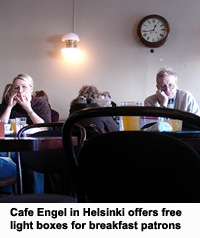 |
 |
 |
|
|
|
|
|
|
|
|
|
|
|
|
|
|
|
|
|
|
|
|
|
|
|
|
|
|
|
|
|
|
|
Posted 08/15/2006
Researcher testing whether
exposure to bright light will help |
 USC
researcher Shawn Youngstedt is about to embark on a round of
illuminating research expected to spotlight the importance of sunshine
in our lives. USC
researcher Shawn Youngstedt is about to embark on a round of
illuminating research expected to spotlight the importance of sunshine
in our lives. Dr. Youngstedt, an assistant professor at the Department of Exercise Science, Arnold School of Public Health, is testing whether exposure to bright light will reduce the stress levels of people with high levels of anxiety. “Bright light has been used to treat depression for some time,” said Youngstedt, an expert on sleep, circadian rhythms and the influence of exercise and bright light on mental health.
Using light to treat depression has gained acceptance in parts of the world where the climate severely limits exposure to sunlight. In Scandinavia, for example, patrons can even take their coffee and croissants beneath light boxes at light cafes (luskafe). But even in subtropical South Carolina, exposure to natural sunlight is no guarantee. “On the whole, people don’t get enough sunlight. Even in very sunny areas of the country the average person is outside less than an hour per day,” Youngstedt said. The bright light/anxiety treatment project will take most of a year to complete. It is supported by a $25,000 grant from the Litebook Company Ltd., a manufacturer of therapeutic lights based in Medicine Hat, Alberta, Canada. The first part of the research involves identifying a sample of about 30 people, ages 18-30, with high levels of anxiety. Youngstedt will ask for volunteers from campus locations such as the USC Counseling and Human Development Center. Newspaper ads are another possible recruiting tool. Applicants will fill out a comprehensive questionnaire followed by screening from a clinical psychologist to exclude subjects who are depressed. After screening, the subjects will be assigned either to bright light treatment or negative ion treatment, another therapy that has been used for depression and anxiety. The negative ion generator is a small metal box with a web of wire filaments jutting from the top. The device produces negatively charged air molecules that, when inhaled, are believed to produce mood enhancing biochemical reactions. The light box used in the test is about the size of a laptop computer and produces a light intensity of about 10,000 lux. Lux is the international measure of the illuminating power of light. Experts say the average living room measures less than 100 lux, while bright office lighting is between 300 to 500 lux. A cloudy day can measure between 1,000 to 5,000 lux. Youngstedt says 10,000 lux is “equivalent to being outside on a sunny day looking at the horizon.” The volunteers will be introduced to the light or negative ion treatment during a 45 minute initial session at Youngstedt’s lab. Following the test, the subjects will fill out a questionnaire reporting on their moods. Blood pressure, an excellent physiological index of anxiety, will be taken before and after the session. From the lab, the testing moves to the subjects’ homes for a four-week period in which, within 15 minutes of awakening, they will be exposed to daily 45-minute sessions with either the light box or the negative ion generator. At the end of each week, a researcher will visit with a questionnaire and take a blood pressure reading. The clinical psychologist will be on call during the treatment period. He and other staffers will be on the alert for side effects that may arise such as headaches or eye soreness. At the end of the test the clinical psychologist will review the treatment with the subjects. Youngstedt says the whole project will probably take about a year to finish before he’s ready to write and publish a report. • If you are interested in volunteering for this study, please contact Dr. Youngstedt at 803-777-9929 or e-mail him at syoungstedt@sc.edu.
|
|
|
|
|
|
|
|
| Columbia, SC 29208 · 803-777-7000 · info@sc.edu | © University of South Carolina Board of Trustees | ||||
 “
“